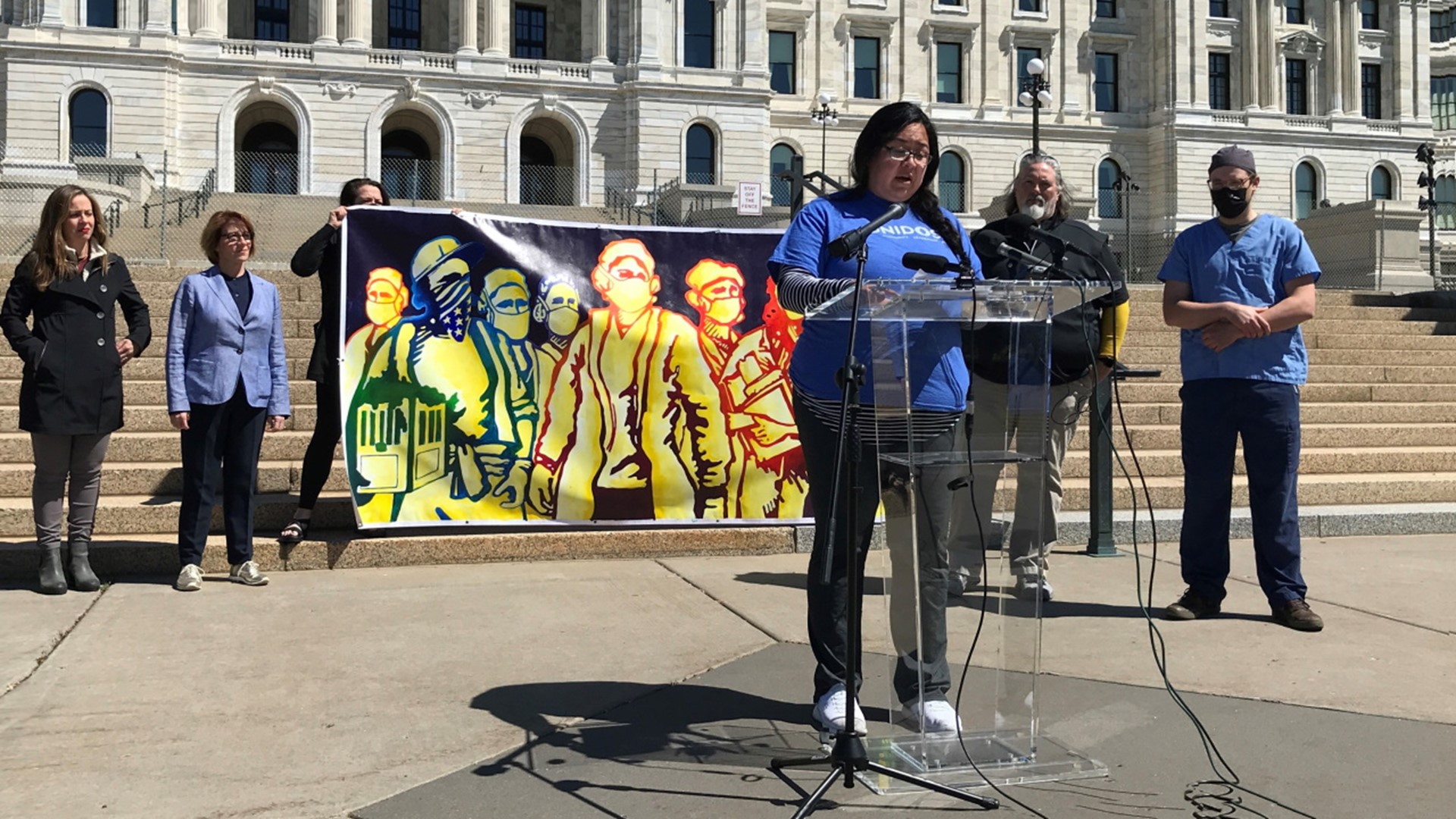ST PAUL, Minn. — They were deemed essential during the pandemic, handling frontline posts that couldn't be done from home. And yet thousands of these workers weren't compensated when COVID exposure forced them to the sidelines.
Many burned through vacation time and accrued sick leave, assuming they had any available in the first place. Now they're counting on Minnesota lawmakers to pass a bill that would let them recover some of that lost income.
Nurses, janitors, school paraprofessionals and others gathered at the Capitol Friday to make their case, and press lawmakers to pass a bill that would provide up to 20 days of back pay to those who lost money due to quarantines or time spent caring for infected family members.
"It’s felt like I’ve been treated, and we’ve been treated as expendable workers," Troy Bowman, a janitor and member of the Service Employees International Union, told reporters.
"In the past year I had to quarantine two times covering over 30 days and I wasn’t paid for any of that time off. I can't work from home!"
Bowman said his first quarantine came after a coworker was exposed. The second one happened when he tested positive for COVID himself.
Rep. Cedrick Frazier of New Hope was able to get his bill passed in the DFL-controlled House. But the GOP-controlled Senate hasn't embraced it yet.
"Please move this bill forward. Take care of our essential workers," Rep. Frazier remarked.
"They are our heroes; they should be treated as such. We’re still in the midst of this pandemic. They are still showing up to do this work."
Under Frazier's bill, those essential workers would be eligible for up to 80 hours of back pay through the FFCRA, the Families First Coronavirus Response Act, passed in 2020. They'd be eligible for an additional 80 hours of pay through the federal American Rescue Plan.
William Schwandt, a paraprofessional in the Bloomington Public Schools, reminded reporters that people like him had to pivot to take on new roles during the pandemic.
"We were there to prepare lunches and distribute them to people in the community," Schwandt, whose main job was working with children with disabilities, explained.
"We also were there to provide tech support to keep teachers and kids connected so that they were able to continue to teach and learn. We made house calls too."
He said 60% of the paraprofessionals in his district have second and third jobs, and many of those vanished during the pandemic.
Nurse Daniel Clute spent the past 14 months treating COVID patients, first at Bethesda Hospital and then at St. Joseph's after Bethesda closed. He lost work time while waiting for COVID test results.
"Working COVID any time you have a sniffle you’re like, 'Oh my God, is it my time? Do I have COVID-19?' So, we were having to get tested all the time," Clute told KARE.
"So, there were quarantines waiting for COVID test, using your sick time and Paid Time Off (vacation days)."
Clute never tested positive for COVID, but he still took extensive precautions to avoid infecting his wife Alex and son Liam. At some points during the pandemic he slept in a tent in their back yard.
"I was camping in the backyard for a while to make sure I wasn't breathing into the house. It was this terrible paranoia that your loved ones are going to get sick."
Eventually his wife, a nurse who worked at St. Joseph's, tested positive. So did their son.
"They tested positive for COVID and were sick for some time and I needed time off from work to support them."
Clute said he appeared at the rally Friday in solidarity with other essential workers who lost even more than he did. He called on lawmakers to follow through with the support they promised at the beginning of the pandemic.
"If you don't make whole these folks who put themselves on the line and put themselves through this, it has frightening implications for health system," he told reporters.
"Because we’ll know in the future that no one’s coming to save us, no one’s is going to rescue us. It's the workers fighting for themselves."
Companies with fewer than 500 employees were required by federal law to give paid leave to workers exposed to the coronavirus, but hospitals and employers with more than 500 people on the payroll were exempt. Some long-term care providers have said back pay would cripple them financially if they had to pay it without government help.
Sen. Erin Murphy, a St. Paul Democrat, said the bill is stuck in the House-Senate working group on the omnibus jobs bill because of objections from the health care industry. Murphy, a former nurse who now teaches at Saint Catherine University's School of Nursing, said lawmakers have a moral obligation to help make frontline workers whole again.
"It is about who we are. Minnesotans who stepped up and faced the unknown to take care of us are now seeking redress in this building. And we have the means to do it."

